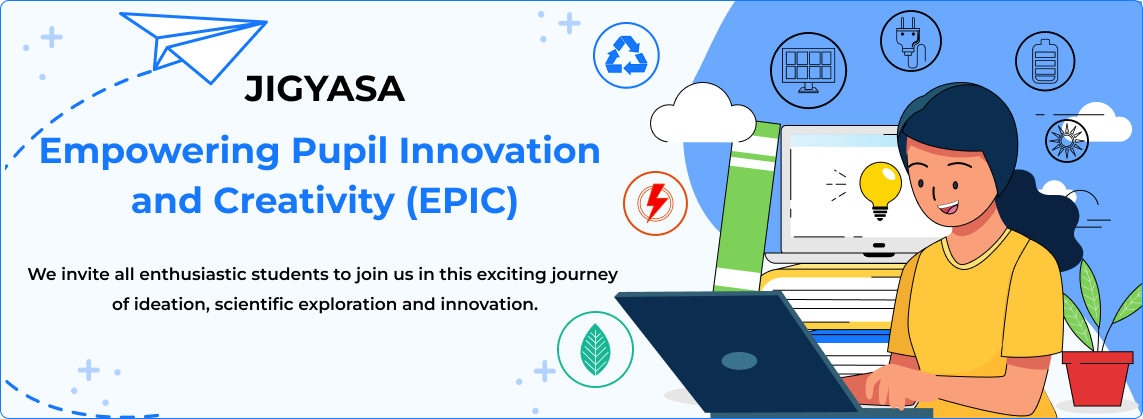
CSIR Jigyasa EPIC Hackathon aims to inculcate the culture of inquisitiveness, innovation and scientific temper among the school students as well as nurture their potential in developing innovative solutions to address the challenges in the country through S&T.
We invite all enthusiastic students to join us in this exciting journey of ideation, scientific exploration and innovation.
Innovation can be in the form of ideas, designs, prototypes, technology and smart apps for solving societal issues and improving life quality.
Timeline
- Launch and start date for application: 05 January, 2024.
- Boot- camps / hackathons: 5th Jan, 2024 - 28th Feb, 2024.
- Last date of applications: 28th Feb, 2024.
- Declaration of top 100 applicants: Last week of April, 2024
- Summer internship for top 100 ideas: June - August, 2024.
- Exhibition and final competition of the top innovations: September, 2024.
- Felicitation of top 5 winners: around 26th September, 2024.
Domain 1: Clean and Green energy
To develop solutions that address real-world energy challenges. It aims to encourage the students to think innovative solutions on energy, increase awareness on the challenges of energy and the importance on sustainable use of energy.
Themes and Challenges:
- Clean Energy Harvesting and Storage: Innovations in capturing and storing renewable energy.
- Efficient Energy Utilization and Management: Ideas to optimize energy use in homes, schools, residential and commercial sectors.
- Waste to Energy: Creative approaches to convert waste into energy.
Details of each theme are given below:
1. Clean Energy Harvesting and Storage:
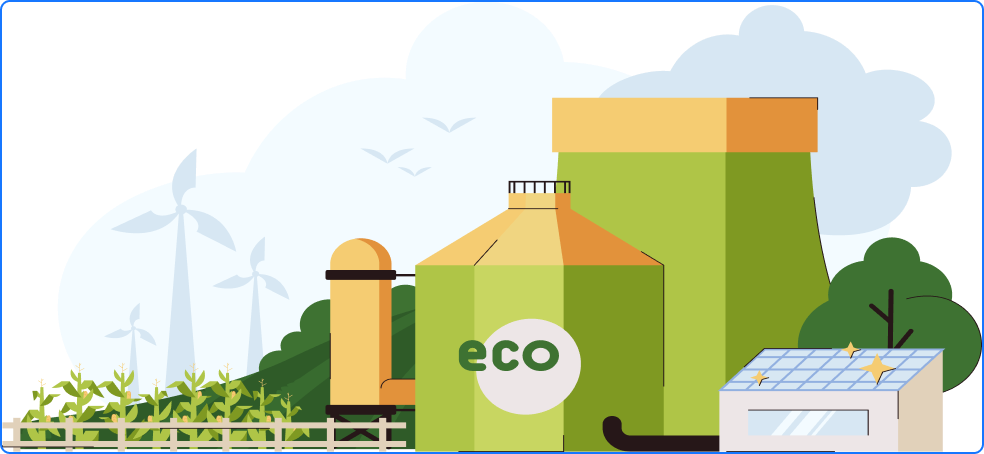
The challenge in clean energy harvesting and storage lies in efficiently capturing renewable energy sources such as solar, wind, water, and hydro power. Storing energy from these sources encourages cost-effective, sustainable, and reliable energy. The variability and intermittency of renewable energy sources, along with the limitations of current storage technologies, pose significant barriers to integrating clean energy into the power grid at scale. The development of advanced materials and technologies for efficient energy capture, conversion, and storage is crucial for reducing our reliance on fossil fuels and mitigating climate change. Indeed, the best way to store solar energy (whenever available) in liquid fuel/chemical molecules, rather than in any storage media. Any liquid fuel can be transported to any part of the country or globe and existing transportation infrastructure can be utilized to its fullest capacity.
2. Efficient Energy Utilization and Management:
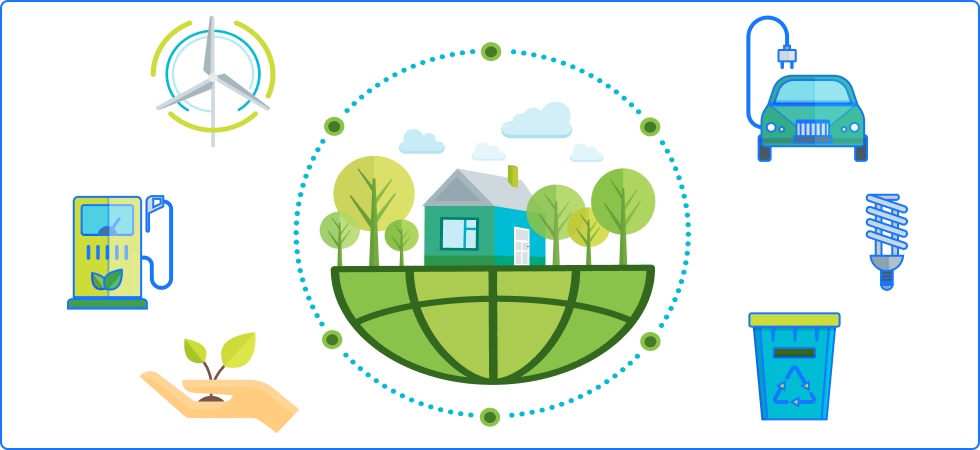
This area focuses on optimizing the use of energy in various sectors, including industrial, commercial, and residential. The primary challenge is to reduce energy consumption and waste while maintaining or improving performance and productivity. This involves the development and implementation of energy-efficient technologies, smart grid systems, and intelligent management strategies that can adapt to changing energy demands. Additionally, there is a need for policies and incentives that encourage energy efficiency and conservation practices among consumers and industries.
3. Waste to Energy:

The conversion of waste materials into usable forms of energy, such as electricity, heat, or fuel, presents a solution on two demanding issues: waste management and energy production. The main challenge is to develop technologies that can efficiently and sustainably convert various types of waste, including municipal solid waste, agricultural residue and industrial by-products into energy.
Tentative Ideas:
- Students may create small-scale prototypes utilizing renewable energy sources such as solar panels, wind turbines, or hydroelectric generators with innovative usage in practical applications.
- Devices or systems designed to reduce energy consumption in homes or schools, like automated LED lighting systems that adjust based on natural light availability or occupancy sensors.
- Simple smart home or school prototypes that use sensors and microcontrollers (like Arduino or Raspberry Pi) to monitor and manage energy usage, potentially integrating with smart phone apps for remote control and monitoring.
- Prototypes for conversion of waste materials into energy, such as biogas generation from organic waste or the conversion of waste heat into electricity.
- Digital tools like games or interactive apps for energy management and utilization.
- Projects that utilize recycled materials to create energy-related devices, emphasizing the importance of sustainability and waste reduction.
- Projects that focus on innovative ways to capture and utilize ambient energy, like piezoelectric devices that generate electricity from pressure or motion, or solar-powered chargers for small electronic devices.
- Students may create a small size device, along the principles of photosynthesis, to work in direct sunlight to convert water and CO2 to any value-added chemical/fuel, such as methanol, ethanol.
- Demonstration of prototypes such as small water electrolyser cells / fuel cells and relevant energy conversion devices with innovative idea towards production storage and utilization of hydrogen.
- Demonstration of small battery cell prototype with innovative ideas (e.g. from recycled materials).
Domain 2: One Health
Innovative solutions to real world problems in domain of healthcare are need of the hour. open data sharing and scalable platforms became game changer in dealing with the COVID- 19 pandemic. It is therefore proposed to develop solutions towards better pandemic preparedness as well as healthcare response in general. This is even more important for countries like India where these solutions can have far reaching impact in providing quality care to a large patient base.
The sub- themes included are as follows:
- Digital solutions to healthcare challenges: Building platforms and apps for capturing data from community settings for disease surveillance and monitoring.
- Affordable prototypes for high-end research and clinical instruments: Ideas to build affordable versions of high-end instruments or their alternatives.
- Towards One Health: Build platforms and apps towards integration of data on
(a) Disease prevalence, measures, policy reach, quality metrics, etc.
(b) Disease management eg. Consultations, use of prescribed/ unprescribed antibiotics, follow up, use of Indian system of medicine, traditional knowledge, recurrence etc.
- Cost effective PoC devices/prototypes: Design and Development of affordable PoC (Point of Care) devices for diagnostics in rural and remote setup.
Tentative Ideas:
- Developing platforms / apps for collecting and using data from community settings from context of Antimicrobial Resistance (examples – antibiotic consumption, access, etc).
- Building applications for veterinary sector for understanding antimicrobial resistance aspects like use of antibiotics, infection status, etc.
- Building applications for environmental sector for understanding antimicrobial resistance aspects like disposal of antibiotics by communities, etc.
- Developing applications and methods of integration of data on disease prevalence in community settings - One Health Approach. These platforms need to ensure data protection and privacy.
- Developing tools for guidelines for best practices for antibiotic usage and disposal, traditional knowledge and alternative medicine.
- Design and Development of affordable PoC (Point of Care) devices for diagnostics in rural and remote setup.

Content Categories
- Developing platforms / apps for collecting and using data from community settings from context of
Antimicrobial Resistance (examples – antibiotic consumption, access, etc).
- Building applications for the veterinary sector for understanding antimicrobial resistance aspects
like use of antibiotics, infection status, etc.
- Building applications for the environmental sector for understanding antimicrobial resistance aspects
like disposal of antibiotics by communities, etc.
- Methods of integration of data on disease prevalence in community settings - One Health Approach.
These platforms need to ensure data protection and privacy

- Students may create small-scale prototypes utilizing renewable energy sources such as solar panels,
wind turbines, or hydroelectric generators with innovative usage in practical applications.
- Devices or systems designed to reduce energy consumption in homes or schools, like automated LED
lighting systems that adjust based on natural light availability or occupancy sensors.
- Simple smart home or school prototypes that use sensors and microcontrollers (like Arduino or
Raspberry Pi) to monitor and manage energy usage, potentially integrating with smartphone apps for
remote control and monitoring.
- Prototypes for conversion of waste materials into energy, such as biogas generation from organic waste
or the conversion of waste heat into electricity.
- Digital tools like games or interactive apps for energy management and utilization.
- Projects that utilize recycled materials to create energy-related devices, emphasizing the importance
of sustainability and waste reduction.
- Projects that focus on innovative ways to capture and utilize ambient energy, like piezoelectric
devices that generate electricity from pressure or motion, or solar-powered chargers for small
electronic devices.
- Students may create a small size device, along the principles of photosynthesis, to work in direct
sunlight to convert water and CO2 to any value added chemical/fuel, such as methanol, ethanol.
- Demonstration of prototypes such as small water electrolyser cells / fuel cells and relevant energy
conversion devices with innovative ideas towards production storage and utilisation of hydrogen.
- Demonstration of small battery cell prototype with innovative ideas (e.g. from recycled materials)

General Rules and Regulations for all submissions:
- The Competition is free to enter and the participants must be Bonafide Indian Citizens.
- Entries are invited from students of class VII to XII.
- A single student or a team of 2 to maximum 3 students may apply.
- The submissions will be made in two categories: Junior (Class VII- IX) and Senior (Class X- XII).
- A student as an individual or as a team cannot submit an application more than once.
- In a team, students from non-science backgrounds may also be included; however, the innovation must be science-based.
- No request for addition or deletion of team members would be entertained after submission.
- You may choose one of the domains to design your creative and should present in a simple language. The medium of submission will be English.
- Decision of the panel of judges (to be constituted by CSIR) would be final.
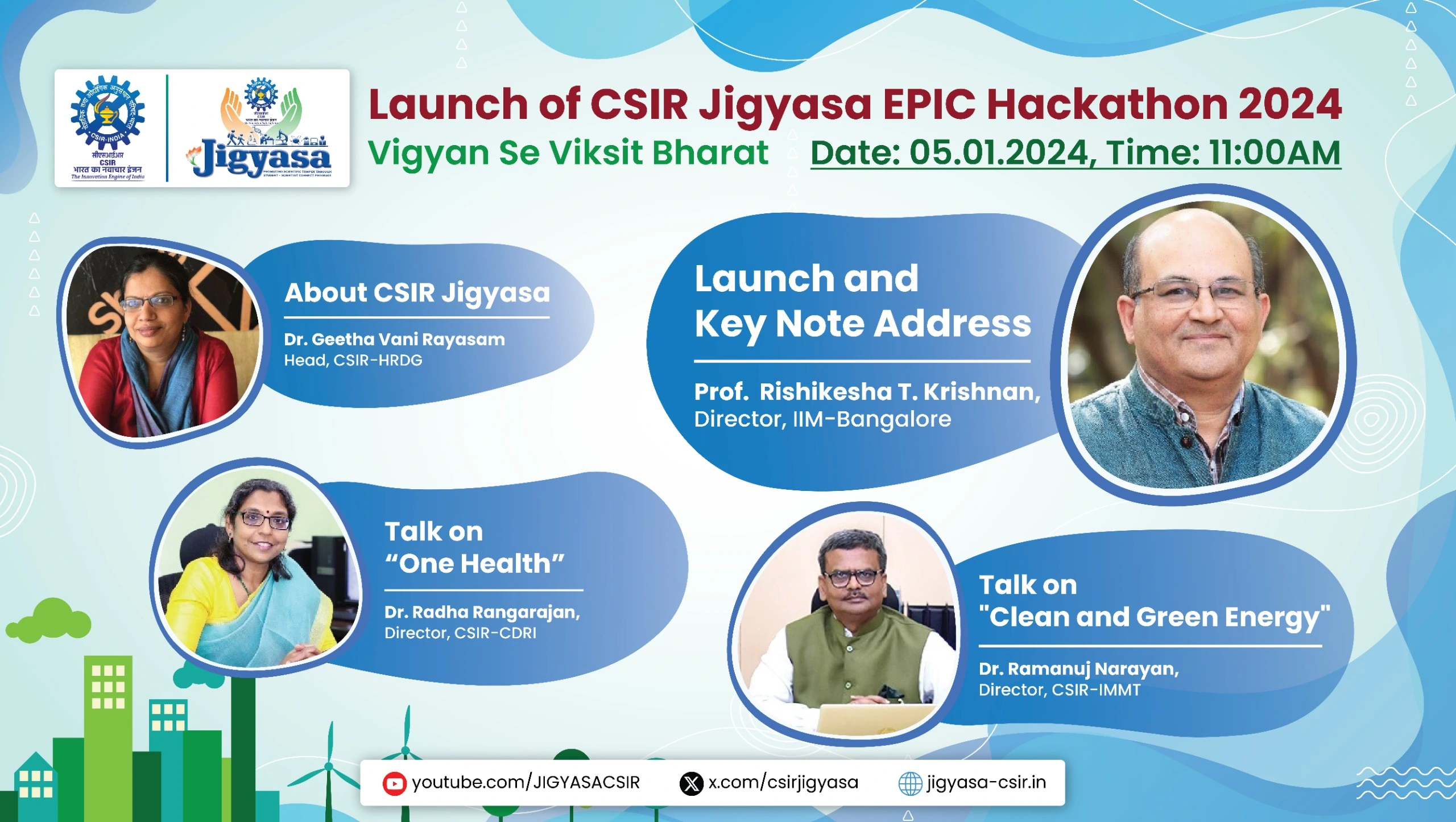
Launch of CSIR JIGYASA EPIC Hackathon 2024:
Vigyan se Viksit Bharat
5 January 2024
11:00 AM
SNo |
Watch |
Theme |
Speakers |
Nodal |
Time |
| 1 |

|
About CSIR Jigyasa |
Dr. Geetha Vani Rayasam |
CSIR-HRDG |
11:00-11:30 AM |
| 2 |

|
Launch and Key Note Address |
Prof. Rishikesha T. Krishnan, Director |
IIM Bangalore |
11:30-12:00 Noon |
| 3 |

|
One Health |
Dr. Radha Rangarajan, Director |
CSIR-CDRI |
12:00-12:30 PM |
| 4 |

|
Clean and Green Energy |
Dr. Ramanuj Narayan, Director |
CSIR-IIMT |
12:30-1:00 PM |
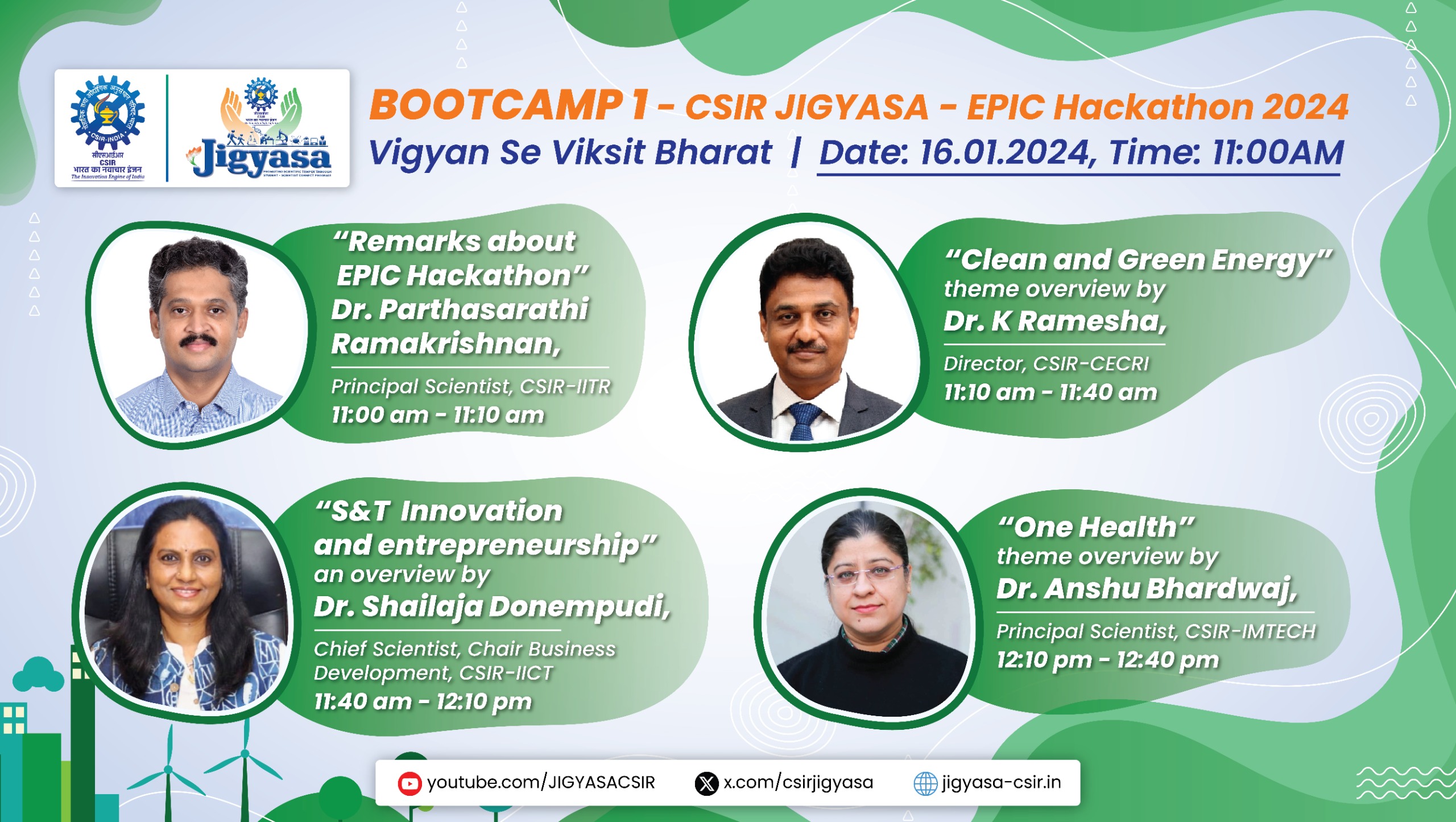
Bootcamp 1 - CSIR JIGYASA - EPIC Hackathon 2024:
Vigyan se Viksit Bharat
16 January 2024
11:00 AM
SNo |
Watch |
Theme |
Speakers |
Nodal |
Time |
| 1 |

|
Inaugration |
|
|
10:58-11:00 AM |
| 2 |

|
Remarks about EPIC Hackathon |
Dr. Parthasarathi Ramakrishnan, Principal Scientist |
CSIR-IITR |
11:00-11:10 AM |
| 3 |

|
Clean and Green Energy |
Dr. K Ramesha, Director |
CSIR-CECRI |
11:10-11:40 PM |
| 4 |

|
S&T Innovation and entrepreneurship |
Dr. Shailaja Donempudi, Chief Scientist, Chair Business development |
CSIR-IICT |
11:40-12:10 PM |
| 5 |

|
One Health |
Dr. Anshu Bhardwaj, Principal Scientist |
CSIR-IMTECH |
12:10-12:40 AM |
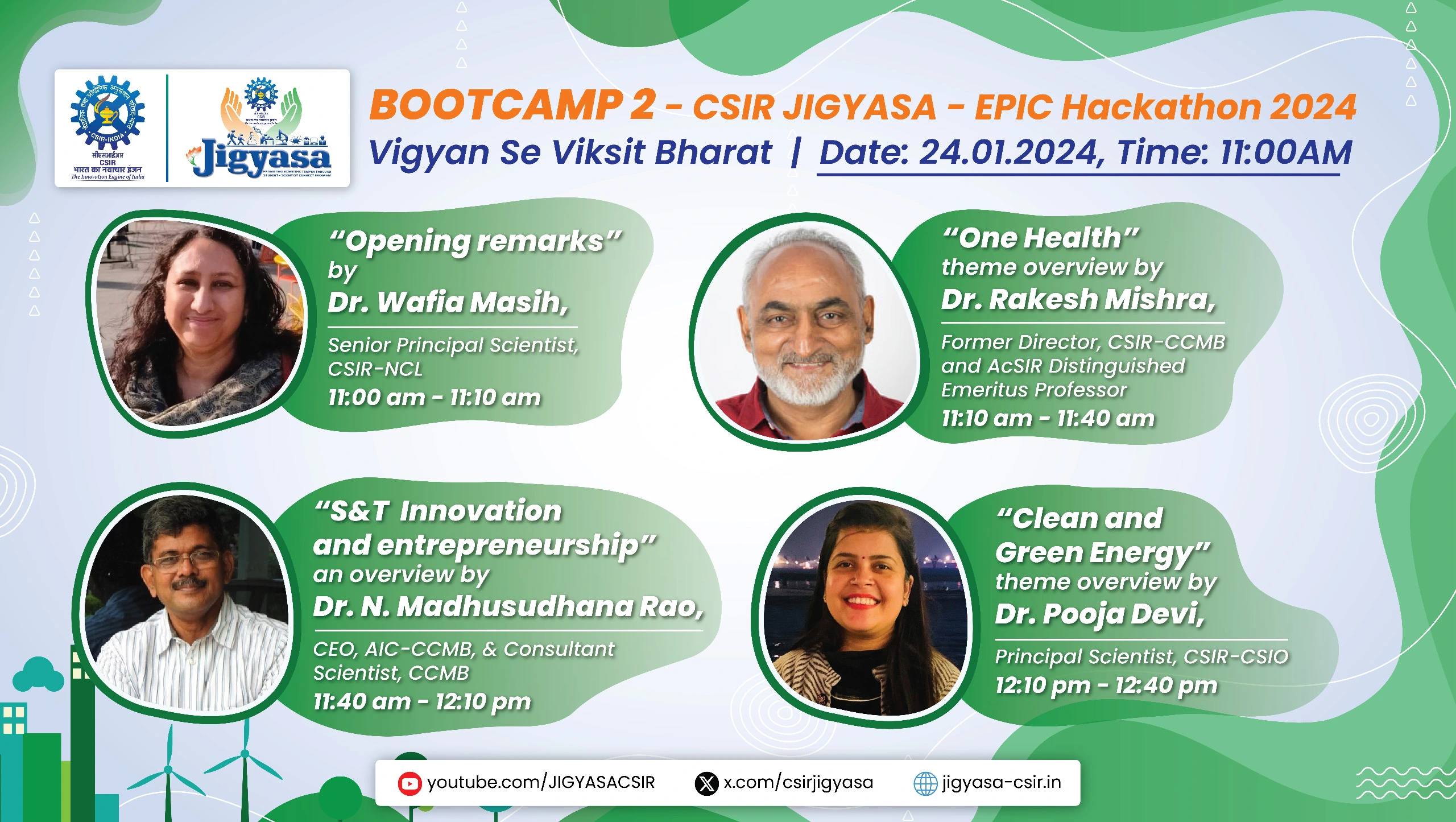
Bootcamp 2 - CSIR JIGYASA - EPIC Hackathon 2024:
Vigyan se Viksit Bharat
24 January 2024
11:00 AM
SNo |
Watch |
Theme |
Speakers |
Nodal |
Time |
| 1 |

|
Opening Remarks |
Dr. Wafia Masih |
CSIR-NCL |
11:00-11:30 AM |
| 2 |

|
One Health |
Dr. Rakesh Mishra, Former Director |
CSIR-CCMB |
11:10-11:40 AM |
| 3 |

|
S&T Innovation and entrepreneurship |
Dr. N. Madhusudana Rao |
CSIR-CCMB |
11:40-12:10 PM |
| 4 |

|
Clean and Green Energy |
Dr. Pooja Devi, Principal Scientist |
CSIR-CSIO |
12:10-12:40 PM |
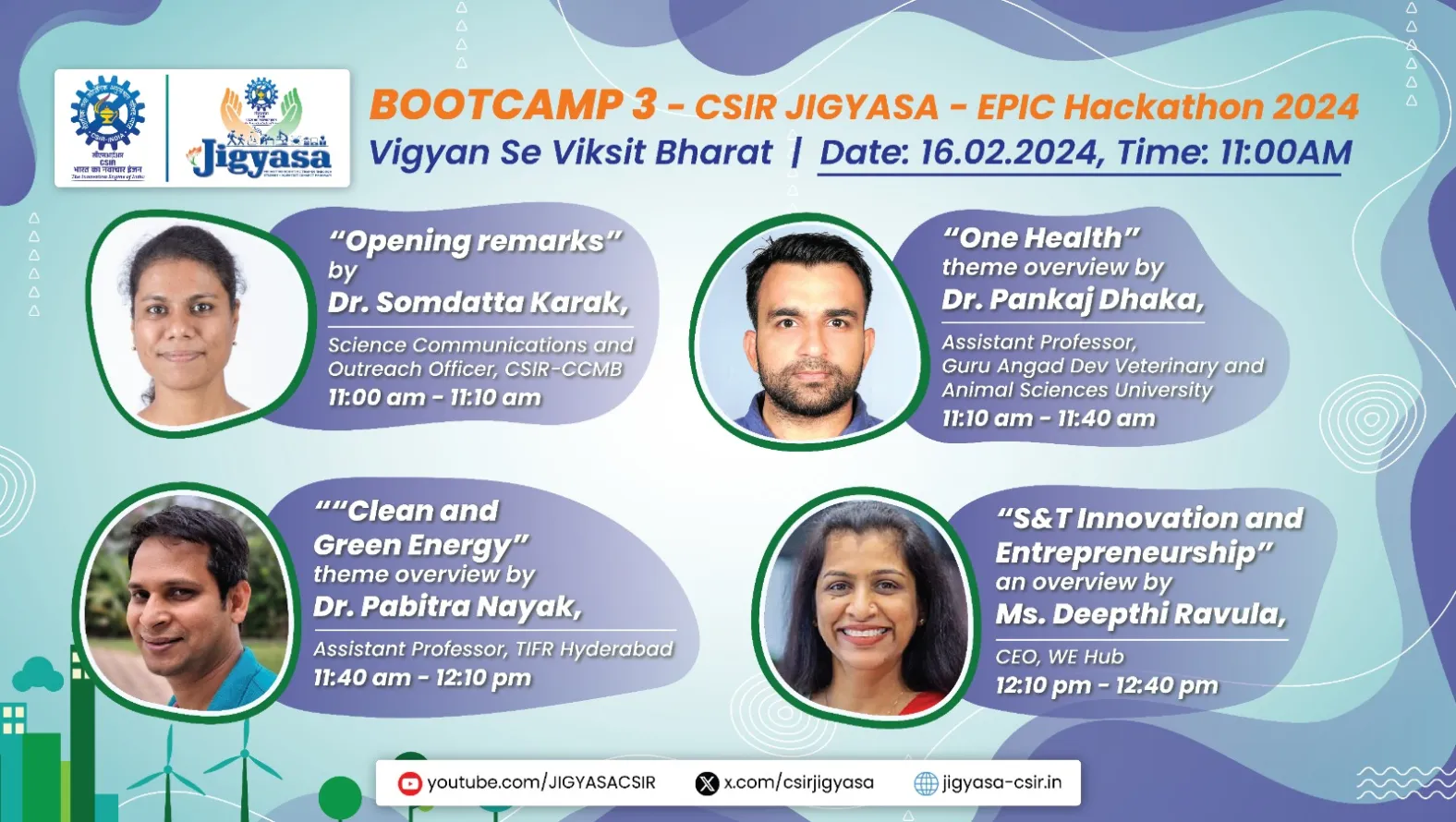
Bootcamp 3 - CSIR JIGYASA - EPIC Hackathon 2024:
Vigyan se Viksit Bharat
16th January 2024
11:00 AM
SNo |
Watch |
Theme |
Speakers |
Nodal |
Time |
| 1 |

|
Opening Remarks |
Dr. Somdutta Karak, Science Communications & Outreach Officer |
CSIR-CCMB |
11:00-11:10 AM |
| 2 |

|
One Health |
Dr. Pankaj Dhaka, Assistant Professor |
GADVASU |
11:10-11:40 AM |
| 3 |

|
Clean and Green Energy |
Dr. Pabitra Nayak, Assistant Professor |
TIFR Hyderabad |
11:40-12:10 PM |
| 4 |

|
S&T Innovation and Entrepreneurship |
Ms. Deepthi Ravula, CEO |
WE Hub |
12:10-12:40 PM |
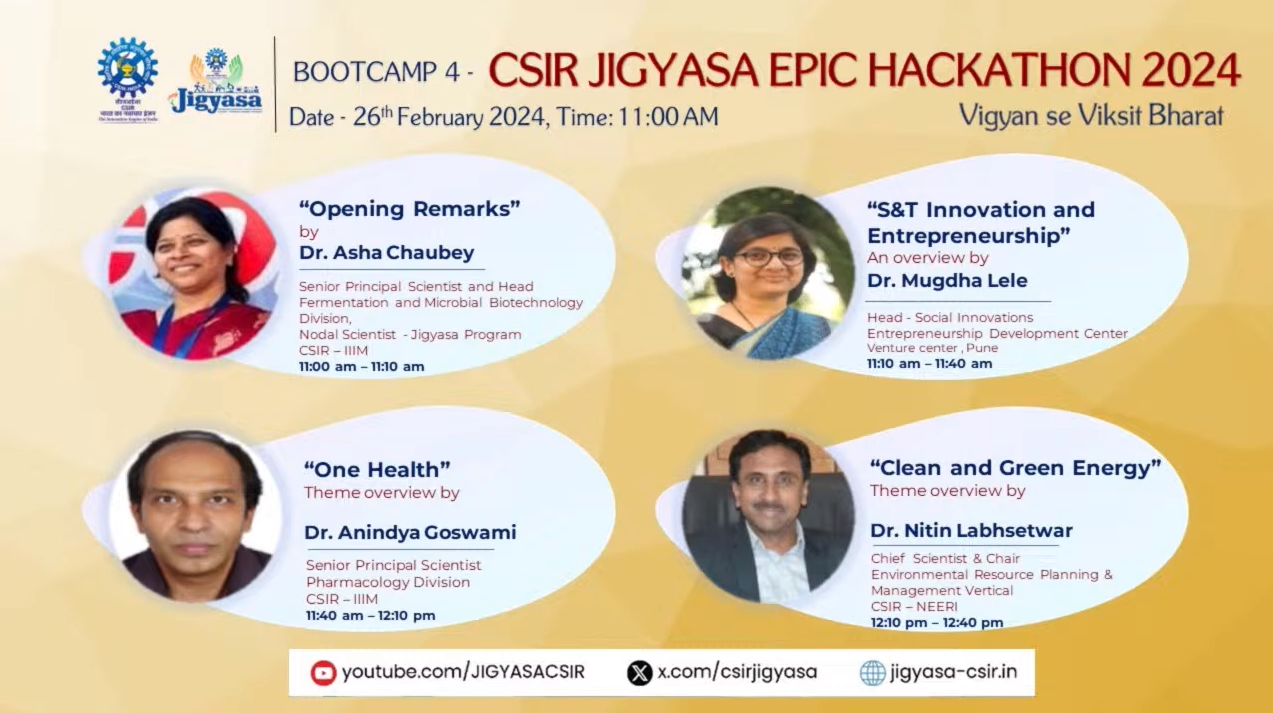
Bootcamp 4 - CSIR JIGYASA - EPIC Hackathon 2024:
Vigyan se Viksit Bharat
26th February 2024
11:00 AM
SNo |
Watch |
Theme |
Speakers |
Nodal |
Time |
| 1 |

|
Opening Remarks |
Dr. Asha Chaubey, Sr. Principal Scientist |
CSIR-IIIM |
11:00-11:30 AM |
| 2 |

|
S&T Innovation and Entrepreneurship |
Dr. Mugdha Lele, Head |
Social Innovations Entrepreneurship Development Centre, Pune |
11:30-11:40 AM |
| 3 |

|
One Health |
Dr. Anindhya Goswami, Sr. Principal Scientist |
CSIR-IIIM |
11:40-12:30 PM |
| 4 |

|
Clean and Green Energy |
Dr. Nitin Labhsetwar, Chief Scientist |
CSIR-NEERI |
12:30-12:40 PM |
The selected students may please note:
- The students will be earmarked to a CSIR laboratory and will be intimated shortly by email.
- The selected students shall undergo summer internships at the identified CSIR laboratories in the hybrid mode for two months.
- The proposals initially submitted may be modified based on a feasibility check by CSIR.
- Selected students have to participate in the CSIR JIGYASA EPIC Summer Internship kick- off meeting which will be intimated shortly.
- For any further queries, please write to jigyasa@csirhrdg.res.in.













